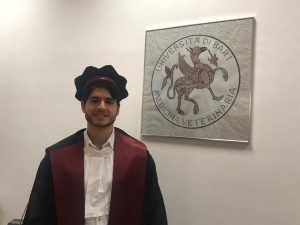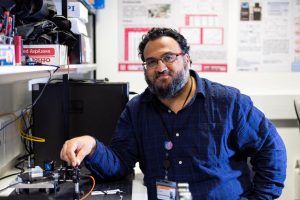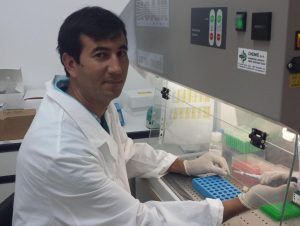"New Technologies in Veterinary Laboratory Diagnostics"
Last date for submission of the application: 07/04/2023
Start date: April 24, 2023
ECTS: 4
Participation fee: 300€
5 weeks
English
elearning
Certificate: Certificate of Specialized Training
EN
Training program language: English
Duration of the course: 100 hours
Training method: exclusively remotely (online, asynchronous education)
Scientific Coordinator of the training program is John A. Ikonomopoulos (Professor of Veterinary Microbiology, A.U.A.)
The program is addressed to:
- Professionals engaged in microbiology laboratory diagnostics, particularly detection of diagnostic indicators associated with the presence of microbial pathogens in samples collected from animals and animal products.
- Graduates and students of postgraduate studies whose subject is similar to the above mentioned.
- Undergraduate students in higher educational institutions and technical schools that provide training in microbiology laboratory diagnostics.
Learning objectives:
A. Knowledge:
- The in-depth understanding of the principles of use, methodology, and specifications of the state-of-the-art methods currently incorporated to veterinary microbiology laboratory diagnostics.
- Become familiar with the digital technologies required to support the application of state-of-the-art veterinary microbiology laboratory diagnostics in practice: digital repositories of molecular data analysis and free access software for the design of oligonucleotide probes and primers.
- Become familiar with the use of open access online records and scientific literature on the spread of infectious diseases of animals and the application of innovative methods of microbiology laboratory diagnostics.
- Become familiar with the software and user interface of hardware laboratory diagnostics (PCR, real time PCR, RT-PCR, MALDI-TOF, IMAGE ANALYSIS, ELISA).
B. Skills
- Strengthen the ability to independently investigate and organize, towards promoting self-improvement and technical expertise.
- Improvement of critical, combinatorial, and inductive ability.
C. Abilities
- The critical evaluation of technical reports (analysis and evaluation protocols) [KNOWLEDGE, COMPREGNITION].
- The ability to design and combine methods that fall within the scope of the training program [KNOWLEDGE, COMPREHENSION].
- The ability to supervise the application of methods that fall within the scope of the training program and integrate them into a functional plan of quality assurance [ANALYSIS].
- To combine the knowledge and theoretical expertise required for the analysis of the scientific information available for the purpose of evaluating and implementing public health protection measures in animal production [ANALYSIS].
Scientific Team:
Scientific and Academic Coordinator of the training program is John A. Ikonomopoulos, Professor of Veterinary Microbiology, Department of Animal Science, AUA.
The training program is delivered by a team of Professors and Researchers of highly reputed research and academic institutions of Greece, Great Britain, Switzerland, Italy, Portugal, and the U.S.A, with long experience in the subject(s) they have been assigned to.
The training program is provided by the following tutors:
- Antonia Mataragka
- Ariadne Loukia Hager-Theodorides
- Erika Ganda
- Dimitris Vlachakis
- Gianvito Lanave
- Gudrun Overesch
- Ilias Tachtsidis
- John A. Ikonomopoulos
- Nicola Decaro
- Nefeli Lagopati
- Patricia Alexandra Curado Quinta Dinis Poeta
- Paola Roncada
- Roberto La Ragione
Trainee obligations / Training Certificate
For the successful completion of the Training Programme, trainees must answer correctly to at least 50% of the questions of the final examination (minimum passing score is 25 out of 50). In this case, trainees receive a Certificate of Specialized Training, which is issued by the CCELL of the Agricultural University of Athens.
Participants who scored 47 or higher, receive, in addition to the Certificate of Specialized Training, a letter signed by the Programme Director certifying that they completed the Training programme with “Distinction”.
Trainees who failed the final examination but scored at least 20 (examination score 20-24) receive a Certificate of Attendance. All the trainees who failed the final examination (examination score<25) may participate in the following cycle of the Training Programme, free of charge, or in one of the subsequent cycles within a period not exceeding 2 years from the deadline of that which they attended, with 50% discount on the corresponding fees. Distinction certificates are not awarded to trainees repeating the Training Programme.
Participation fee / Discount policy
The attendance fee is 300 euros.
Discount policy:
- Undergraduate students of the Agricultural University of Athens: 15%
- Undergraduate students of other Universities or Technological Institutions: 10%
- Residents of the European Board of Veterinary Specialisation: 15%
- Registration before March the 17th, 2023 (early registration discount): 20%*
- Participants repeating the Training Programme within 2 years after an unsuccessful attempt: 50%
Attendance fees must be deposited before the beginning of the Training Programme (the deadline for the submission of the attendance fees is recorded in the acceptance letter addressed to the trainee).
* The early registration discount does not apply in combination with the discounts recorded above.
GR
Γλώσσα προγράμματος: Αγγλική
Διάρκεια: 100 ώρες
Μέθοδος Εκπαίδευσης: εξ αποστάσεως (e-learning) εξολοκλήρου μέσω ασύγχρονης εκπαίδευσης
Επιστημονικός Υπεύθυνος του προγράμματος είναι ο Ιωάννης Οικονομόπουλος (Καθηγητής, Τμήμα Επιστήμης Ζωικής Παραγωγής, ΓΠΑ)
Το πρόγραμμα απευθύνεται σε:
- Επαγγελματίες που ασχολούνται με τη μικροβιολογική εργαστηριακή διάγνωση λοιμωδών νοσημάτων, και συγκεκριμένα, με την εργαστηριακή ανίχνευση διαγνωστικών δεικτών που σχετίζονται με την παρουσία μικροβιακών παθογόνων σε δειγμάτων που συλλέγονται από ζώα και ζωικά προϊόντα.
- Απόφοιτοι και φοιτητές προγραμμάτων μεταπτυχιακών σπουδών των οποίων το αντικείμενο είναι παρεμφερές με τα ανωτέρω αναφερόμενα.
- Φοιτητές ή σπουδαστές που είναι εγγεγραμμένοι σε ανώτερα και ανώτατα εκπαιδευτικά ιδρύματα της αλλοδαπής ή ημεδαπής, των οποίων το αντικείμενο είναι παρεμφερές με τα προαναφερθέντα, υπό τις ακόλουθες προϋποθέσεις: ➢ διαθεσιμότητα θέσεων συμμετοχής στο πρόγραμμα εκπαίδευσης, ➢ επιτυχής υλοποίηση τουλάχιστον του 30% του προγράμματος των προπτυχιακών τους σπουδών, ➢ πιστοποίηση επαρκούς γνώση της αγγλικής γλώσσας.
Εκπαιδευτικοί – μαθησιακοί στόχοι προγράμματος:
Α. Γνώσεις:
- Η εις βάθος αντίληψη των αρχών λειτουργίας, της μεθοδολογίας, και των προδιαγραφών των μεθόδων υψηλής τεχνολογίας που χρησιμοποιούνται σήμερα στο πλαίσιο της μικροβιολογικής εργαστηριακής διάγνωσης.
- Εξοικείωση με τις ακόλουθες ψηφιακές τεχνολογίες που βρίσκουν εφαρμογή σε καινοτόμες μεθόδους εργαστηριακής διάγνωσης: ψηφιακά αποθετήρια δεδομένων μοριακής ανάλυσης και λογισμικά ελεύθερης πρόσβασης για σχεδιασμό ιχνηθετών και ολιγονουκλεοτιδικών εκκινητών.
- Εξοικείωση χρήσης διαδικτυακών αποθετηρίων και επιστημονικών δημοσιεύσεων ελεύθερης πρόσβασης με εξειδίκευση σε δεδομένα διάδοσης λοιμωδών νοσημάτων και στην εφαρμογή καινοτόμων μεθόδων εργαστηριακής διάγνωσης.
- Εξοικείωση με το λογισμικό και τη διεπαφή χρήστη υλισμικού μικροβιολογικής εργαστηριακής διάγνωσης (PCR, real time PCR, RT-PCR, MALDI-TOF, IMAGE ANALYSIS, ELISA).
Β. Δεξιότητες
- Ενίσχυση της επάρκειας αυτόνομης διερεύνησης και οργάνωσης με σκοπό τη μάθηση και την αυτοβελτίωση.
- Βελτίωση της κριτικής, συνδυαστικής και επαγωγικής ικανότητας.
Γ. Ικανότητες
- Η κριτική αξιολόγηση των τεχνικών εκθέσεων (πρωτόκολλα ανάλυσης και αξιολόγησης).
- Η ικανότητα σχεδιασμού και συνδυασμού μεθόδων που εμπίπτουν στο αντικείμενο του εκπαιδευτικού προγράμματος.
- Η ικανότητα επίβλεψης της εφαρμογής μεθόδων που εμπίπτουν στο αντικείμενο του εκπαιδευτικού προγράμματος και της ένταξής τους σε ένα λειτουργικό πλαίσιο ποιοτικού ελέγχου.
- Η αξιοποίηση της γνώσης και της θεωρητικής κατάρτισης στην ανάλυση των διαθέσιμων επιστημονικών δεδομένων με σκοπό την αξιολόγηση και εφαρμογή μέτρων προστασίας της δημόσιας υγείας στη ζωική παραγωγή.
Επιστημονική ομάδα:
Επιστημονικός και Ακαδημαϊκός Υπεύθυνος του εκπαιδευτικού προγράμματος είναι ο Ιωάννης Οικονομόπουλος, Καθηγητής του Τμήματος Επιστήμης Ζωικής Πραγωγής, του Γ.Π.Α., με γνωστικό αντικείμενο Κτηνιατρική Μικροβιολογία.
Η ομάδα των εκπαιδευτών του προγράμματος συνίσταται από Καθηγητές Πανεπιστημίου και Ερευνητές που υπηρετούν σε διεθνούς κύρους ερευνητικά κέντρα και ακαδημαϊκά ιδρύματα στην Ελλάδα, στη Μεγάλη Βρετανία, στην Ελβετία, στην Ιταλία, στην Πορτογαλία και στις Η.Π.Α. Κοινό χαρακτηριστικό όλων των μελών της εκπαιδευτικής ομάδας είναι η εξειδίκευση και η σημαντική ερευνητική εμπειρία στο αντικείμενο διδασκαλίας που έχουν αναλάβει. Η εκπαιδευτική ομάδα αποτελείται από τους εξής εκπαιδευτές:
- Antonia Mataragka
- Ariadne Loukia Hager-Theodorides
- Erika Ganda
- Dimitris Vlachakis
- Gianvito Lanave
- Gudrun Overesch
- Ilias Tachtsidis
- John A. Ikonomopoulos
- Nicola Decaro
- Nefeli Lagopati
- Patricia Alexandra Curado Quinta Dinis Poeta
- Paola Roncada
- Roberto La Ragione
Υποχρεώσεις εκπαιδευόμενων/Πιστοποιητικό Επιμόρφωσης
Για την επιτυχή ολοκλήρωση του εκπαιδευτικού προγράμματος, οι εκπαιδευόμενοι πρέπει να απαντήσουν σωστά τουλάχιστον στο 50% των ερωτήσεων της τελικής εξέτασης, να επιτύχουν δηλαδή βαθμό τουλάχιστον 25, με άριστα το 50. Σε αυτή την περίπτωση, οι εκπαιδευόμενοι λαμβάνουν Πιστοποιητικό Εξειδικευμένης Επιμόρφωσης, το οποίο εκδίδεται από το Κέντρο Επιμόρφωσης και Διά Βίου Μάθησης του ΓΠΑ.
Οι συμμετέχοντας που επέτυχαν βαθμολογία τελικής εξέτασης τουλάχιστον 47, λαμβάνουν, επιπλέον του Πιστοποιητικού Εξειδικευμένης Επιμόρφωσης, επιστολή υπογεγραμμένη από τον Διευθυντή του Εκπαιδευτικού Προγράμματος, στην οποία βεβαιώνεται ότι το ολοκλήρωσαν με «Διάκριση» (Distinction).
Στην περίπτωση μη επιτυχούς υλοποίησης του εκπαιδευτικού προγράμματος, ο εκπαιδευόμενος έχει τη δυνατότητα να συμμετάσχει δωρεάν στον αμέσως επόμενο κύκλο σπουδών που θα υλοποιηθεί, ή με έκπτωση 50% επί των αντίστοιχων διδάκτρων, σε οποιονδήποτε άλλο κύκλο σπουδών υλοποιηθεί εντός περιόδου που δεν θα υπερβαίνει τα 2 έτη από την καταληκτική ημερομηνία του προγράμματος που παρακολούθησε.
Κόστος Συμμετοχής / Εκπτωτική Πολιτική
Το τέλος συμμετοχής είναι 300 ευρώ.
Εκπτωτική πολιτική:
- Προπτυχιακοί φοιτητές ΓΠΑ: έκπτωση 15%
- Προπτυχιακοί φοιτητές, σπουδαστές: έκπτωση 10%
- Ειδικευόμενοι του European Board of Veterinary Specialisation: 15%
- Εγγραφή έως και τις 17/03/2023 (έκπτωση πρώιμης εγγραφής): 20% *
- Συμμετέχοντες που επαναλαμβάνουν το πρόγραμμα εκπαίδευσης εντός 2 ετών από μία μη-επιτυχή συμμετοχή τους: 50%
Τα δίδακτρα πρέπει να καταβάλλονται πριν την έναρξη του προγράμματος προκειμένου να κατοχυρώνεται η συμμετοχή σε αυτό (η ακριβής καταληκτική ημερομηνία κατάθεσης των διδάκτρων ανά κύκλο σπουδών, αναφέρεται στην επιστολή που λαμβάνει ο υποψήφιος κατά την αποδοχή της αίτησης συμμετοχής του στο πρόγραμμα).
* Η έκπτωση πρώιμης εγγραφής δεν ισχύει συνδυαστικά με τις παραπάνω αναφερόμενες.
EN
Introduction
The Center of Continuing Education and Lifelong Learning (CCELL) of the Agricultural University of Athens (AUA) welcomes you to the training program titled “New Technologies in Veterinary Laboratory Diagnostics”. The duration of the course is 100 hours, and it is provided exclusively remotely (online, asynchronous education), in English.
Scientific Coordinator of the training program is John Ikonomopoulos (Professor of Veterinary Microbiology, A.U.A.)
Purpose
- Disseminate the knowledge necessary to understand the possibilities and limitations of the new technologies applied in microbiology laboratory diagnostics, with a view to broadening their routine application, towards improving the protection of public and animal health.
- The creation of the infrastructure that can promote technical expertise and know-how among students and professionals in the field of Animal Science.
Program necessity
During the last two decades, the progress recorded in the field of microbiology laboratory diagnostics has been remarkable! This was achieved thanks to technical innovations that resolved limitations of conventional methodologies, expanding our know-how and capacity for in-depth investigation of the causation, and spread of infectious diseases. However, the integration of this technological progress into practice proved a major challenge, since the level of training required for its reliable application is high, and the scientific knowledge necessary for its understanding, wide. In consequence, the transfer of this technology to practice, or in other words, its translational potential, is low. This knowledge gap is addressed by the training program titled “New Technologies in Veterinary Laboratory Diagnostics”, which aims to the dissemination of the knowledge required to reliably apply this technology routinely, towards improving the protection of public and animal health.
Structure of the educational program
Module title | Subsection title |
1. Challenges in Veterinary Medicine
| 1.1 The One Health concept |
| 1.2 The context of zoonotic diseases today: challenges and threats | |
| 1.3 Antimicrobial drug resistance in animals and their impact on public health | |
| 1.4 Molecular diagnostics for the assessment of antimicrobial drug resistance: The peculiarities of Mycoplasma spp | |
2. New technologies in veterinary laboratory diagnostics | 2.1 The polymerase chain reaction |
| 2.2 The reverse transcriptase polymerase chain reaction | |
| 2.3 Real time polymerase chain reaction | |
| 2.4 BLAST analysis: An Introduction | |
| 2.5 Isothermal amplification techniques | |
| 2.6 Assessment of gene activity with real time PCR | |
| 2.7 Next generation sequencing | |
| 2.8 Bio-informatics | |
| 2.9 Artificial Intelligence and Big Data Processing | |
| 2.10 Proteomics: Methods and Application | |
3. Quality control in conventional and molecular diagnostics | 3.1 Quality Assurance and Standardization in Veterinary Diagnostic Laboratories |
| 3.2 Quality Assurance in PCR-based diagnostics | |
4. With a view to the future | 4.1 Nanotechnology advances with a view to Veterinary Medicine |
| 4.2 Interaction between veterinary medicine and nanotechnology; the present and the near future | |
| 4.3 Understanding animal welfare in farmed animals – beyond behavioral assessment towards brain functional imaging |
Method of implementation
The training program is provided exclusively in English in the form of online asynchronous learning and lasts 100 hours (4 ECTS units).
The programme is available twice a year and lasts 5 weeks.
The candidates must submit their application for registration at least 1 month before the beginning of the cycle they wish to attend. Approval/rejection of the application is announced before the beginning of the relevant cycle. Successful candidates receive instructions for the payment of the tuition fees and access to the e-learning platform of the training program, which remains open to the trainees throughout its duration.
Training program implementation schedule – important dates
Timetable | |||||
Registrations begin | Deadline for early bird registration | Registrations concluded | Deadline for payment of tuition*
| Beginning of the Training Programme | Conclusion – Final Examination |
20/02/2023 | 17/03/2023 | 31/03/2023 | 10/04/2023 | 24/04/2023 | 27/05/2023 |
*Confirmation of payment of tuition fees is required before access to the Programme’s training platform is granted.
Evaluation Methodology
A. Evaluation of trainees
The final examination is conducted online through the E-class platform of the training program and is supervised remotely via a digital camera. The students sitting the examination are expected to provide answers to 50 questions of different types (multiple choice, matching type, true or false), in 2h. The questions of the final examination are similar but not identical to those of the self-assessment tests.
Each correct answer is scored with 1 point and each false, with zero (0). False answers to questions of key-significance may receive negative score (<1 point). Negative score does not apply to questions that remain uansewered; these questions are scored with zero (0).
Trainees may take part in the final examination twice (i.e., 100 questions in total, selected randomly from the pool of examination questions). However, both attempts must be completed within the 2h period available for the examination. After the end of each attempt, trainees have access to their score, but not the correct answers. The top score of the two attempts is registered as the examination’s final score. Time extension is not foreseen for non-completed efforts. In the event of system failure, this is confirmed by the staff of the Training Program (examination superivsor), and the examination is repeated for those trainees that were affected by the malfunction.
During the final exam, trainess are expected to be alone, which will be confirmed through an online video session that will remain active in paprallel with the E-class examination until its completion.
B. Evaluation of the training program
The Training Programme is evaluated by the trainees, who are expected to submit an evaluation report composed in the form of a questionnaire. This questionnaire is submited to the Secretariat of the Training Programme, after its completion.
The conclusions of the evaluation are used for the continuous improvement of the quality of the Training Programme.
Training techniques – Tools – Equipment
The educational material, including self-assessment tests and final examination, is available through the CCELL e-learning platform (Eclass).
Trainees may submit questions to the tutors via e-mail sent to the Secretariat of the Training Programme.
The training program does not provide computer or internet access. Trainees are expected to have a digital camera available to accommodate an online video session during the final examination.
Educational Material – Additional Resources
The educational material is organized into modules, subsections, and lectures. The material corresponding to each lecture consists of lecture notes, video presentation(s), and a self-assessment test.
The lecture notes corresponding to each module are available in pdf and consist of a table of contents, summary, the body of the lecture, and references for further reading and/or documentation.
The video presentation is narrated by the tutor and highlights the main subjects of the respective lecture notes, providing explanatory comments and additional information. The duration of each video presentation is 20-40 min; some lectures consist of more than one video presentations. Additional training material (videos and interactive content) is available for many of the programme’s subsections.
The self-assessment tests are available through the E-class platform of the Training Program and consist of a combination of different types of questions (multiple choice, matching type, true or false), corresponding to the relevant lecture (lecture notes and presentation). Trainees can take part in the self-assessment test several times, and are expected to provide answers to 10-20 randomly selected questions of those available for the relevant lecture (lecture notes and presentation), in 6 -10 min. At the end of each attempt, each trainee has access to the score of the respective attempt but not the correct answers.
A mock exam will be available two weeks before the final examination. Within this period, trainees can sit the mock exam several times and are expected to answer 50 questions within 60min. The questions of the mock exam are selected randomly from the pool of the self-assessment questions and are similar but not identical to those of the final examination. At the end of each attempt, trainees have access to the respective score and the correct answers.
The scores of the self-assessment exercises and mock exam are used exclusively as a means of self-assessment and are not officially registered in the student’s profile.
Depending on the subject of the lecture, trainees receive instructions for the use of open access, online virtual laboratory training platforms. This service does not constitute integral part of the Training Programme and is provided based on availability. Trainees are encouraged but not obliged to make use of these resources.
GR
Εισαγωγή
Το Κέντρο Επιμόρφωσης και Διά Βίου Μάθησης (Κ.Ε.ΔΙ.ΒΙ.Μ.) του Γεωπονικού Πανεπιστημίου Αθηνών (ΓΠΑ) σας καλωσορίζει στο εκπαιδευτικό πρόγραμμα με τίτλο «New Technologies in Veterinary Laboratory Diagnostics», διάρκειας 100 ωρών, το οποίο παρέχεται αποκλειστικά στην αγγλική γλώσσα και διεξάγεται εξ αποστάσεως (e-learning) εξολοκλήρου μέσω ασύγχρονης εκπαίδευσης.
Επιστημονικός Υπεύθυνος του προγράμματος είναι ο Ιωάννης Οικονομόπουλος (Καθηγητής Κτηνιατρικής Μικροβιολογίας, ΓΠΑ).
Σκοπός
- Η διάδοση της γνώσης που είναι απαραίτητη για την κατανόηση των δυνατοτήτων και των περιορισμών των νέων τεχνολογιών που βρίσκουν εφαρμογή στον τομέα της εργαστηριακής μικροβιολογικής διάγνωσης, προς την κατεύθυνση της διεύρυνσης της εφαρμογής τους στην πράξη, για τη βελτίωση της προστασίας της δημόσιας υγείας και της υγείας των ζώων.
- Η δημιουργία της υποδομής μέσω της οποίας θα διευκολύνεται η αναβάθμιση της τεχνικής και επιστημονικής κατάρτισης φοιτητών και επαγγελματιών του κλάδου των Επιστημών Ζώων.
Αναγκαιότητα Προγράμματος
Κατά τη διάρκεια κυρίως των δύο τελευταίων δεκαετιών, σημειώθηκε μεγάλη πρόοδος στον τομέα της μικροβιολογικής εργαστηριακής διάγνωσης. Η πρόοδος αυτή επήλθε ως αποτέλεσμα της διεθνούς έρευνας που αναβάθμισε το υπάρχον επίπεδο τεχνογνωσίας. Ωστόσο, η ενσωμάτωση αυτής της τεχνολογικής προόδου στην πράξη συνιστά σημαντικότατη πρόκληση, δεδομένου ότι ο όγκος των σχετικών επιστημονικών στοιχείων πολύ μεγάλος, αλλά και το επίπεδο κατάρτισης που απαιτείται για την αξιόπιστη εφαρμογή τους, εξαιρετικά ευρύ. Αυτό έχει ως συνέπεια, η ενσωμάτωση της επιστημονικής προόδου στις υπηρεσίες που παρέχονται προς το κοινό από αυτούς που δραστηριοποιούνται στον συγκεκριμένο κλάδο να γίνεται με τρόπο αποσπασματικό, βραδύ και συχνά αναξιόπιστο. Το εκπαιδευτικό πρόγραμμα με τίτλο ¨New Technologies in Veterinary Laboratory Diagnostics¨, εστιάζεται στην αντιμετώπιση ακριβώς αυτού του προβλήματος και αποσκοπεί στη διάδοση της γνώσης που είναι απαραίτητη για την κατανόηση των δυνατοτήτων και των περιορισμών των νέων τεχνολογιών που βρίσκουν εφαρμογή στον τομέα της μικροβιολογικής εργαστηριακής διάγνωσης, προς την κατεύθυνση της διεύρυνσης της εφαρμογής τους στην πράξη, για τη βελτίωση της προστασίας της δημόσιας υγείας και της υγείας των ζώων.
Δομή Εκπαιδευτικού Προγράμματος
Τίτλος διδακτικής ενότητας | Τίτλος υποενότητας |
1. Challenges in Veterinary Medicine
| 1.1 The One Health concept |
| 1.2 The context of zoonotic diseases today: challenges and threats | |
| 1.3 Antimicrobial drug resistance in animals and their impact on public health | |
| 1.4 Molecular diagnostics for the assessment of antimicrobial drug resistance: The peculiarities of Mycoplasma spp | |
2. New technologies in veterinary laboratory diagnostics | 2.1 The polymerase chain reaction |
| 2.2 The reverse transcriptase polymerase chain reaction | |
| 2.3 Real time polymerase chain reaction | |
| 2.4 BLAST analysis: An Introduction | |
| 2.5 Isothermal amplification techniques | |
| 2.6 Assessment of gene activity with real time PCR | |
| 2.7 Next generation sequencing | |
| 2.8 Bio-informatics | |
| 2.9 Artificial Intelligence and Big Data Processing | |
| 2.10 Proteomics: Methods and Application | |
3. Quality control in conventional and molecular diagnostics | 3.1 Quality Assurance and Standardization in Veterinary Diagnostic Laboratories |
| 3.2 Quality Assurance in PCR-based diagnostics | |
4. With a view to the future | 4.1 Nanotechnology advances with a view to Veterinary Medicine |
| 4.2 Interaction between veterinary medicine and nanotechnology; the present and the near future | |
| 4.3 Understanding animal welfare in farmed animals – beyond behavioral assessment towards brain functional imaging |
Μέθοδος Υλοποίησης
Το εκπαιδευτικό πρόγραμμα διατίθεται αποκλειστικά στην αγγλική γλώσσα, είναι διάρκειας 100 ωρών (4 μονάδες ECTS) και παρέχεται εξολοκλήρου μέσω ασύγχρονης εξ αποστάσεων εκπαίδευσης.
Το πρόγραμμα υλοποιείται ετησίως δύο φορές και η διάρκειά του είναι 5 εβδομάδες.
Οι εκπαιδευόμενοι πρέπει να καταθέτουν την αίτηση εγγραφής τους τουλάχιστον 1 μήνα πριν την έναρξη του κύκλου σπουδών που επιθυμούν να παρακολουθήσουν. Στο αμέσως επόμενο διάστημα, δηλαδή μεταξύ της καταληκτικής ημερομηνίας υποβολής αιτήσεων και της έναρξης του εκπαιδευτικού προγράμματος, οι εκπαιδευόμενοι ενημερώνονται για την αποδοχή της αίτησής τους και λαμβάνουν οδηγίες για την κατάθεση των διδάκτρων. Ακολούθως, παρέχεται πρόσβαση στην πλατφόρμα τηλεκπαίδευσης.
Το εκπαιδευτικό υλικό διατίθεται στους εκπαιδευόμενους μέσω της εξειδικευμένης πλατφόρμας E-class Κ.Ε.ΔΙ.ΒΙ.Μ. που τους παρέχει απρόσκοπτη πρόσβαση σε αυτό, εντός της χρονικής περιόδου υλοποίησης του κάθε κύκλου σπουδών.
Χρονοδιάγραμμα υλοποίησης προγράμματος εκπαίδευσης – σημαντικές ημερομηνίες
Χρονοδιάγραμμα | |||||
Έναρξη εγγραφών | Λήξη περιόδου πρώιμης εγγραφής | Πέρας εγγραφών | Πληρωμή διδάκτρων μέχρι | Έναρξη Εκπαιδευτικού Προγράμματος*
| Ολοκλήρωση – Τελική εξέταση |
20/02/2023 | 17/03/2023 | 31/03/2023 | 10/04/2023 | 24/04/2023 | 27/05/2023 |
*Προϋπόθεση συμμετοχής αποτελεί η επιβεβαίωση πληρωμής των διδάκτρων.
Μεθοδολογία αξιολόγησης
Α. Αξιολόγηση Εκπαιδευομένων
Η τελική εξέταση γίνεται εξ αποστάσεως μέσω της πλατφόρμας E-class Κ.Ε.ΔΙ.ΒΙ.Μ. του προγράμματος εκπαίδευσης, με επίβλεψη μέσω ψηφιακής κάμερας, και περιλαμβάνει συνδυασμό 50 ερωτήσεων πολλαπλής επιλογής, αντιστοίχισης και επιλογής σωστού/λάθους. Οι σωστές απαντήσεις όλων των ερωτήσεων προσδίδουν μία μονάδα. Ορισμένες από τις επιλογές που περιλαμβάνονται στις ερωτήσεις της τελικής εξέτασης επιβαρύνονται με αρνητική βαθμολογία που δεν υπερβαίνει τη μία μονάδα. Ερωτήσεις που δεν απαντηθούν, δεν επιβαρύνονται με αρνητική βαθμολογία. Οι ερωτήσεις της τελικής εξέτασης δεν ταυτίζονται με αυτές των ασκήσεων αυτό-αξιολόγησης.
Ο εκπαιδευόμενος έχει το δικαίωμα να επαναλάβει την τελική εξέταση 2 φορές. Το χρονικό διάστημα που είναι διαθέσιμο για την τελική εξέταση είναι 2 ώρες (συνολικά 100 ερωτήσεις που επιλέγονται τυχαία από την τράπεζα ερωτήσεων του προγράμματος). Εντός αυτού του διαστήματος ο εκπαιδευόμενος είναι υποχρεωμένος να ολοκληρώσει τη μία ή και τις δύο προσπάθειές του. Μετά το πέρας της κάθε του προσπάθειας, ο εκπαιδευόμενος έχει πρόσβαση στη βαθμολογία του, αλλά όχι στις σωστές απαντήσεις. Ο βαθμός που καταχωρείται για την τελική εξέταση είναι ο υψηλότερος από αυτούς που επέτυχε ο εκπαιδευόμενος. Δεν δίνεται παράταση χρόνου για μη-ολοκληρωμένες προσπάθειες. Σε περίπτωση αποτυχίας ή διακοπής σύνδεσης κατά την εξέταση λόγω τεχνικού προβλήματος, αυτό επαληθεύεται από το προσωπικό του προγράμματος εκπαίδευσης και γίνεται προγραμματισμός για την επανάληψη της εξέτασης.
Κατά τη διάρκεια της τελικής εξέτασης, ο εκπαιδευόμενος θα πρέπει να είναι μόνος του στον χώρο, κάτι που επιβεβαιώνεται μέσω παράλληλης βιντεοσκόπισης (απαιτείται ψηφιακή κάμερα).
Β. Αξιολόγηση του εκπαιδευτικού προγράμματος
Το πρόγραμμα αξιολογείται από τους εκπαιδευόμενους, οι οποίοι καλούνται να καταθέσουν τα σχόλιά τους μέσω ερωτηματολογίου που υποβάλλεται στη Γραμματεία του προγράμματος μετά την ολοκλήρωσή του. Τα συμπεράσματα της αξιολόγησης αξιοποιούνται με σκοπό τη συνεχή βελτίωση της ποιότητας του προγράμματος εκπαίδευσης.
Τεχνικές εκπαίδευσης – Εργαλεία – Εξοπλισμός
Το σύνολο του εκπαιδευτικού υλικού διατίθεται μέσω της πλατφόρμας τηλεκπαίδευσης E-class Κ.Ε.ΔΙ.ΒΙ.Μ., συμπεριλαμβανομένων των ασκήσεων κατανόησης της διδαχθείσας ύλης, αυτό-αξιολόγησης και τελικής εξέτασης.
Οι εκπαιδευόμενοι έχουν τη δυνατότητα υποβολής ερωτήσεων στους εκπαιδευτές μέσω μηνύματος ηλεκτρονικής αλληλογραφίας που θα αποστέλλεται στη γραμματεία του εκπαιδευτικού προγράμματος.
Στο πλαίσιο του εκπαιδευτικού προγράμματος δεν διατίθεται ψηφιακός εξοπλισμός ή σύνδεση στο διαδίκτυο. Για συμμετοχή στην τελική εξέταση απαιτείται ψηφιακή κάμερα που ενεργοποιείται κατά τη διάρκειά της.
Εκπαιδευτικό Υλικό – Πρόσθετες Πηγές
Το εκπαιδευτικό υλικό είναι οργανωμένο σε ενότητες, υπο-ενότητες και διαλέξεις. Το διδακτικό υλικό που αντιστοιχεί σε κάθε διάλεξη συνίσταται από ένα κείμενο, μία ή και περισσότερες οπτικοακουστικές παρουσιάσεις (video) και μία άσκηση αυτό-αξιολόγησης.
Το κείμενο που αντιστοιχεί σε κάθε διδακτική ενότητα διατίθεται σε μορφή pdf και περιλαμβάνει πίνακα περιεχομένων, περίληψη, το σώμα της διάλεξης, και βιβλιογραφικές αναφορές για επιπλέον μελέτη (further reading) και τεκμηρίωση.
Η οπτικοακουστική παρουσίαση που αντιστοιχεί σε κάθε διδακτική ενότητα περιλαμβάνει φωνητική περιγραφή από τον εκπαιδευτή, και εστιάζεται στα κύρια μέρη της διάλεξης παραθέτοντας επεξηγηματικό ή και ενίοτε, επιπλέον υλικό. Η κάθε παρουσίαση είναι διάρκειας 20-40 min. Επιπλέον εκπαιδευτικό υλικό (βίντεο και διαδραστικό περιεχόμενο) διατίθεται για πολλές από τις υπο-ενότητες του προγράμματος.
Οι ασκήσεις αυτό-αξιολόγησης διατίθενται μέσω της πλατφόρμας E-class Κ.Ε.ΔΙ.ΒΙ.Μ. του προγράμματος εκπαίδευσης, περιλαμβάνουν συνδυασμό ερωτήσεων πολλαπλής επιλογής, αντιστοίχισης, επιλογής σωστού/λάθους, και αφορούν την εκάστοτε διάλεξη (κείμενο διάλεξης και παρουσίαση). Ο εκπαιδευόμενος έχει το δικαίωμα να επαναλάβει την κάθε άσκηση όσες φορές το επιθυμεί απαντώντας σε 10-20 τυχαία επιλεγμένες ερωτήσεις από το σύνολο των ερωτήσεων της διάλεξης, εντός 10-20 λεπτών. Μετά το πέρας της κάθε προσπάθειας, ο εκπαιδευόμενος έχει πρόσβαση στη βαθμολογία του (όχι στις σωστές απαντήσεις), η οποία χρησιμοποιείται μόνο ως μέσο αυτό-βελτίωσης (δεν καταχωρείται για το εκπαιδευτικό πρόγραμμα).
Μία άσκηση προσομοίωσης της τελικής εξέτασης θα είναι διαθέσιμη στην ψηφιακή πλατφόρμα εκπαίδευσης για δύο εβδομάδες πριν την τελική εξέταση. Σε αυτό το διάστημα, οι εκπαιδευόμενοι μπορούν να εκτελέσουν την άσκηση όσες φορές το επιθυμούν απαντώντας σε 50 ερωτήσεις εντός 60 λεπτών. Οι ερωτήσεις αυτής της άσκησης επιλέγονται τυχαία από την τράπεζα ερωτήσεων των ασκήσεων αυτό-αξιολόγησης και είναι παρεμφερείς με αυτές της τελικής εξέτασης. Μετά το πέρας κάθε προσπάθειας, ο εκπαιδευόμενος έχει πρόσβαση στη βαθμολογία του και στις σωστές απαντήσεις.
Επιπλέον, αναλόγως του αντικειμένου της διάλεξης, υποδεικνύονται στον εκπαιδευόμενο σύνδεσμοι ελεύθερης πρόσβασης σε πλατφόρμες εικονικής εργαστηριακής εκπαίδευσης. Το σχετικό υλικό κοινοποιείται επικουρικά στους εκπαιδευόμενους και δεν περιλαμβάνεται στη διδακτέα ύλη του εκπαιδευτικού προγράμματος. Υπό αυτή την έννοια, η διάθεση του υλικού αυτού δεν αποτελεί δέσμευση του εκπαιδευτικού προγράμματος, και η παρακολούθησή του, αν και συνιστάται, δεν αποτελεί υποχρέωση του εκπαιδευόμενου.

Antonia Mataragka
Registered Analyst at the Laboratory of Microbiology and Molecular Analysis
Curriculum Vitae

Ariadne Loukia Hager-Theodorides

Erika Ganda
Assistant Professor of Food Animal Microbiomes, PennState College of Agricultural Sciences, Department of Animal Science, The Pennsylvania State University, U.S.A.
Curriculum Vitae

Gianvito Lanave
Researcher at the Department of Veterinary medicine University Aldo Moro of Bari
Curriculum Vitae
Gudrun Overesch
Head of the Centre for zoonoses, bacterial animal diseases and antimicrobial resistance (ZOBA), Institute of Veterinary Bacteriology, University of Bern, Switzerland.
Curriculum Vitae
John A. Ikonomopoulos
John Ikonomopoulos, Professor of Veterinary Microbiology, Agricultural University of Athens, Greece, Department of Animal Science, Athens, Greece.
Κτηνίατρος (Αριστοτέλειο Πανεπιστήμιο Θεσσαλονίκης, Τμήμα Κτηνιατρικής) με εξειδίκευση στην Κτηνιατρική Μικροβιολογία (MSc, Royal Veterinary College, University College London, UK),
και στη Μοριακή Μικροβιολογία (PhD, Αριστοτέλειο Πανεπιστήμιο Θεσσαλονίκης, Τμήμα Κτηνιατρικής σε συνεργασία με το Εθνικό Καποδιστριακό Πανεπιστήμιο Αθηνών, Τμήμα Ιατρικής).
Αναπληρωτής Καθηγητής Υγιεινής Ζώων και Κτηνιατρικής Μικροβιολογίας, στο Τμήμα Επιστήμης Ζωικής Παραγωγής του Γεωπονικού Πανεπιστημίου Αθηνών.
Curriculum Vitae
Tachtsidis Ilias
Professor in Biomedical Engineering, Department of Medical Physics and Biomedical Engineering, University College London, London, UK.
Curriculum Vitae
Nicola Decaro
Full Professor of Infectious Diseases of Domestic Animals at the Department of Veterinary Medicine, Università degli studi di Bari Aldo Moro, Italy
Curriculum Vitae
Nefeli P. Lagopati
Curriculum Vitae
Patrícia Alexandra Curado Quintas Dinis Poeta
Professor of Veterinary Microbiology, University of Trás-os-Montes and Alto Douro (UTAD), Department of Veterinary Science, Vila Real, Portugal.
Curriculum Vitae
Paola Roncada
Associate Professor of Microbiology and Animal Infectious Diseases at the Department of Health Sciences, Magna Græcia University of Catanzaro, Italy.
Curriculum Vitae
Roberto La Ragione
Professor of Veterinary Microbiology and Pathology, School of Veterinary Medicine, University of Surrey, UK.
Curriculum Vitae
Dimitrios P. Vlachakis
Dr Dimitrios P. Vlachakis, Assistant Professor in Genetics at the Genetics Laboratory, Biotechnology Dept of the Agricultural University of Athens, Principal Investigator at the Clinical, Experimental Surgery & Translational Research Unit of the Biomedical Research Foundation of the Academy of Athens, and Affiliated Researcher (Associate Professor Level) at the University Research Institute of Maternal and Child Health and Precision Medicine, School of Medicine, National and Kapodistrian University of Athens.
He leads the Dark DNA Group (darkdna.gr).
Curriculum Vitae